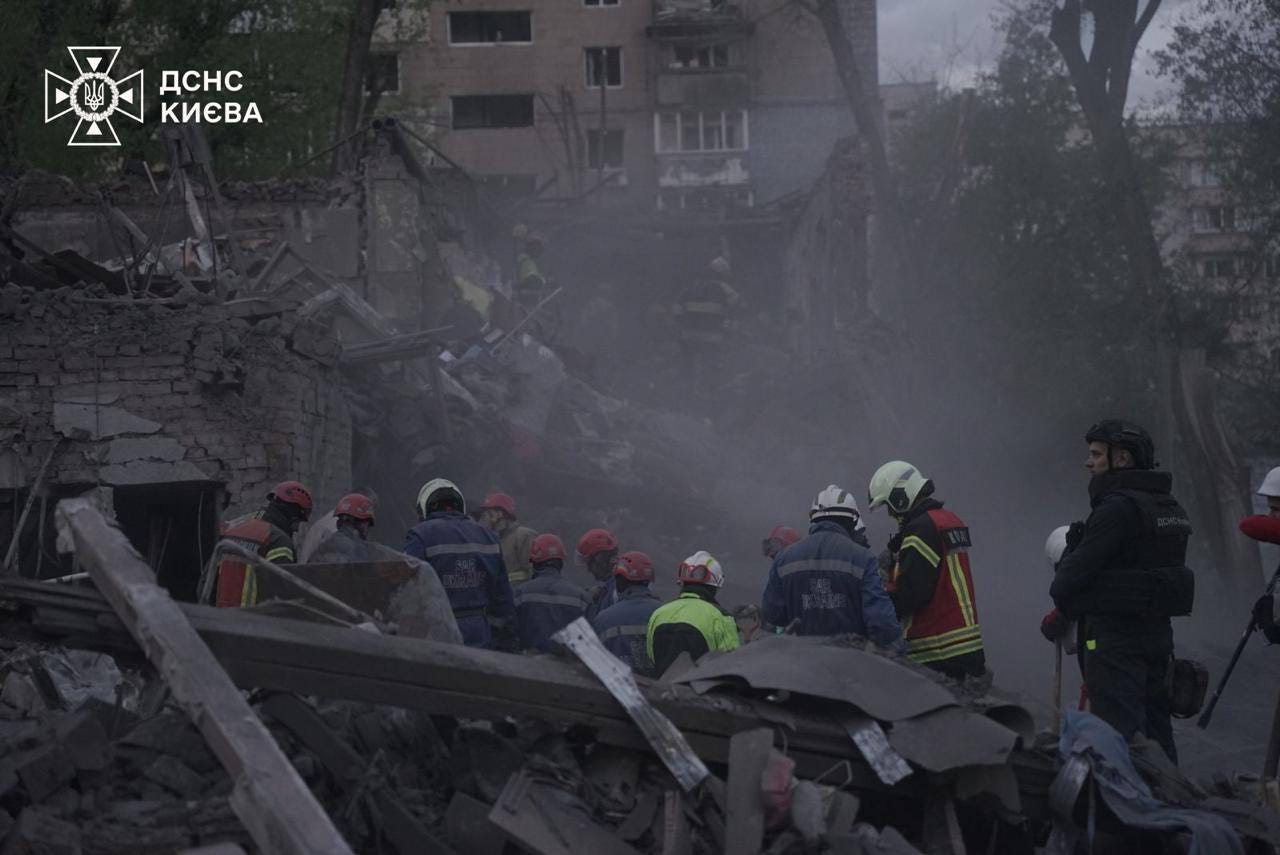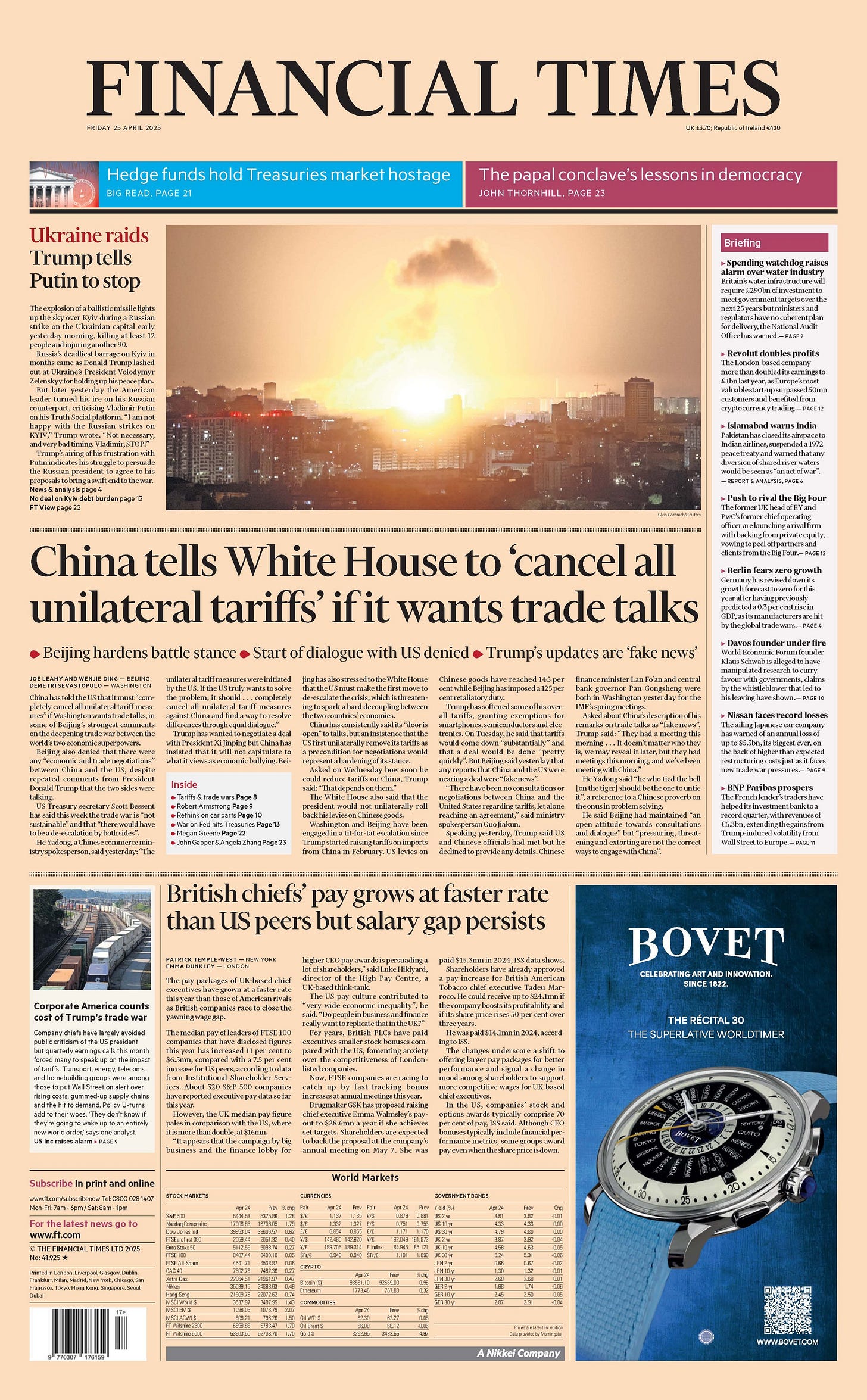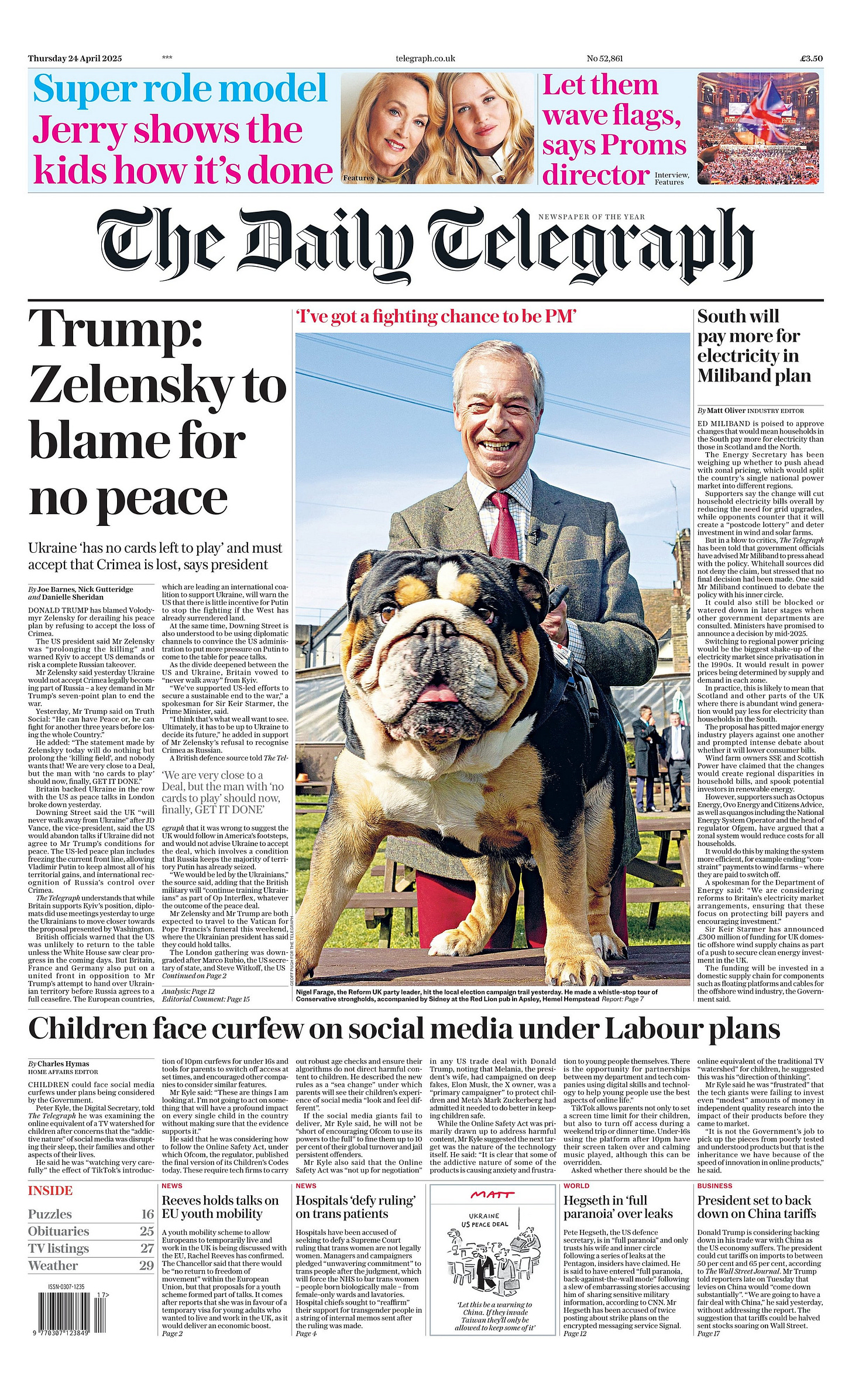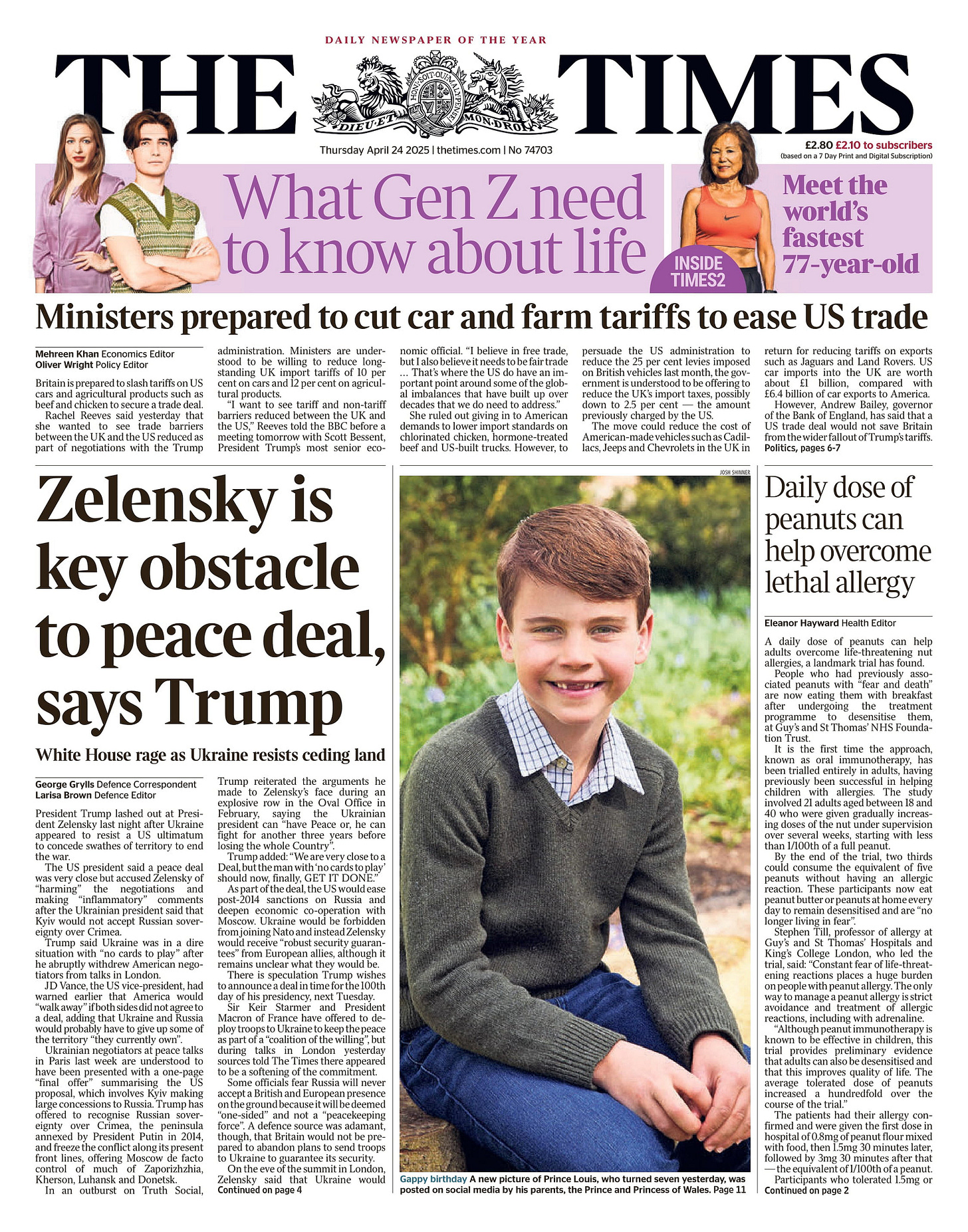Trump’s Mixed Messaging: Tough Talk for Putin, Cold Dismissal for Zelensky
White House Strategy Unclear — But May Tilt Toward Moscow
President Donald Trump on Thursday offered rare criticism of Vladimir Putin, urging the Russian leader to “STOP!” after a deadly barrage of attacks on Kyiv, Ukraine’s capital. “I am not happy with the Russian strikes on KYIV. Not necessary, and very bad timing. Vladimir, STOP! 5000 soldiers a week are dying,” Trump said in a post on his Truth Social platform. “Lets get the Peace Deal DONE!” Russia struck Kyiv with an hours-long barrage of missiles and drones. At least 12 people were killed and 90 were injured in the deadliest assault on the city since last July. Trump’s frustration is growing as a U.S.-led effort to get a peace agreement between Ukraine and Russia has not made progress. Trump lashed out at Ukrainian President Volodymyr Zelenskyy on Wednesday and accused him of prolonging the “killing field” by refusing to surrender the Russia-occupied Crimea Peninsula as part of a possible deal. Russia illegally annexed that area from Ukraine in 2014. Trump’s criticism of Putin is notable because Trump has repeatedly said Russia, the aggressor in the conflict, is more willing than Ukraine to get a deal done. “I thought it might be easier to deal with Zelenskyy,” Trump told reporters Wednesday. “So far it’s been harder, but that’s OK. It’s all right.” In his dealings with Zelenskyy and Putin, Trump has focused on which leader has leverage. Putin has “the cards” and Zelenskyy does not, Trump has said repeatedly. At the same time, the new Republican administration has taken steps toward a more cooperative line with Putin, for whom Trump has long shown admiration - AP
My comment: My discussion on BBC’s The Context (watch above) offered key analysis on the rapidly unfolding Ukraine-Russia headlines. It aired just before one of the deadliest Russian strikes on Kyiv and other cities in months. While the Trump White House issued rare words of condemnation, the lack of clear red lines from Washington only emboldens Putin to escalate attacks and seize more territory. Make no mistake: all indicators suggest a looming U.S. ceasefire proposal will be heavily tilted toward Moscow—deeply damaging for Ukraine and President Zelensky. Why Trump’s favoritism toward Putin? As a former colleague put it: “Trump has been fascinated by Putin since the latter came to power. Putin is exactly what Trump would like to be.” Increasingly, the Trump administration’s rhetoric and actions feel unmistakably Kremlinesque.

China on Thursday denied U.S. President Donald Trump's assertion that the two sides were involved in active negotiations over tariffs, saying that any suggestion of progress in this matter was as groundless as “trying to catch the wind.” China’s comments come after Trump said Tuesday that the final tariff rate on China's exports would come down “substantially” from the current 145%. “China’s position is consistent and we are open to consultations and dialogues, but any form of consultations and negotiations must be conducted on the basis of mutual respect and in an equal manner,” said Ministry of Commerce spokesman He Yadong. “Any claims about the progress of China-U.S. trade negotiations are groundless as trying to catch the wind and have no factual basis.” Trump had told reporters earlier in the week that "everything’s active” when asked if he was engaging with China, although his Treasury Secretary had said there were no formal negotiations. Trump had put 145% tariffs on imports from China, while China hit back with 125% tariffs on U.S. products. While Trump has given other countries a 90-day pause on the tariffs, as their leaders pledged to negotiate with the U.S., China remained the exception. Instead, Beijing raised its own tariffs and deployed other economic measures in response while vowing to “fight to the end.” For example, China restricted exports of rare earth minerals and raised multiple cases against the U.S. at the World Trade Organization. China also made it clear that talks should involve the cancellation of all tariffs it currently faces. “The unilateral tariff increase measures were initiated by the United States. If the United States really wants to solve the problem, it should face up to the rational voices of the international community and all parties at home, completely cancel all unilateral tariff measures against China, and find ways to resolve differences through equal dialogue,” said He, the spokesman. Despite the economic measures leveled against China, Trump said Tuesday that he would be “very nice” and not play hardball with Chinese President Xi Jinping. “We’re going to live together very happily and ideally work together,” Trump said - ABC News
The United States is poised to offer Saudi Arabia an arms package worth well over $100 billion, six sources with direct knowledge of the issue told Reuters, saying the proposal was being lined up for announcement during U.S. President Donald Trump's visit to the kingdom in May. The offered package comes after the administration of former President Joe Biden unsuccessfully tried to finalize a defense pact with Riyadh as part of a broad deal that envisioned Saudi Arabia normalizing ties with Israel. The Biden proposal offered access to more advanced U.S. weaponry in return for halting Chinese arms purchases and restricting Beijing's investment in the country. Reuters could not establish if the Trump administration's proposal includes similar requirements. The White House, Pentagon and Saudi government communications office did not immediately respond to requests for comment. In his first term, Trump celebrated weapons sales to Saudi Arabia as good for U.S. jobs. Lockheed Martin Corp could supply a range of advanced weapons systems including C-130 transport aircraft, two of the sources said. One source said Lockheed would also supply missiles and radars - Reuters
Tensions between India and Pakistan are threatening to boil over as the two countries trade diplomatic and economic measures following a deadly attack in the disputed region of Jammu and Kashmir that has raised fears of another military escalation between the nuclear-armed rivals. India downgraded its ties with Pakistan on April 23 and accused it of supporting "cross-border terrorism" a day after 26 people were killed by gunmen at a Himalayan tourist attraction in Pahalgam in Indian-administered Kashmir. A little-known militant group called The Resistance Front claimed responsibility for the attack. Twenty-five of those killed were Indian nationals. The attack and its fallout risk inflaming ties between India and Pakistan, which both claim authority over the region. Among other punitive measures taken against Islamabad, New Delhi closed the main border crossing linking the two countries, expelled Pakistani diplomats, and ordered some Pakistani visa holders to leave within 48 hours. India also announced the suspension of the six-decade old Indus Waters Treaty, which shares water between the two countries. Pakistan has denied any involvement and responded with countermeasures of its own on April 24, suspending visas for some Indian nationals and expelling certain Indian diplomats and defense officials from the country. Pakistani Prime Minister Shehbaz Sharif also called for a "credible investigation" into the attack and said "India must resist the temptation to exploit such tragic incidents to its advantage." - RFE/RL
Israel's military has admitted killing a United Nations (UN) worker with tank fire, having previously denied responsibility, in an incident in the Gaza Strip last month. After a UN staff member was killed when a UN compound in Deir al-Balah was damaged on 19 March, the Israel Defense Forces (IDF) said it had not struck the site. But the IDF said on Thursday that the initial findings of its investigation into the incident indicated its troops had in fact killed the UN worker after wrongly identifying the building as containing an "enemy presence". It said in a statement: "The building was struck due to assessed enemy presence and was not identified by the forces as a UN facility." These preliminary findings have been shared with the UN and the full conclusion will also be provided, it said. It added: "The IDF regrets this serious incident and continues to conduct thorough review processes to draw operational lessons and evaluate additional measures to prevent such events in the future. "We express our deep sorrow for the loss and send our condolences to the family." The incident, which killed Bulgarian UN worker Marin Valev Marinov and seriously injured five other UN personnel, came a day after Israel renewed its offensive against Hamas after a two-month ceasefire collapsed - BBC






